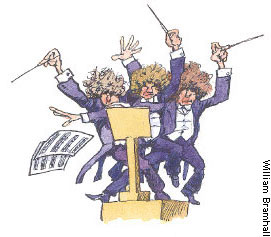|
by Philippa Ibbotson www.guardian.co.uk Tuesday 6 October 2009 
For all their huge salaries, it is hard to say what difference the conductor really makes to the playing of music Conductors are a mysterious breed. Oozing self-belief, elevated on a podium, they are endowed by critics and public alike with magical abilities. As the writer Elias Canetti observed: "There is no more obvious expression of power than the performance of a conductor." Yet for all this power, what they actually do remains an enigma. In fact, it is one of the most frequently asked questions of an orchestral musician. You might say that while orchestras can play unaided, it is helpful if someone can follow a score and beat time clearly. And that if they can also manage musicians with respect, as well as help shape a performance, so much the better. There are some conductors who achieve this, whose passion is inspiring, whose insights provoke, reveal, or enhance. And there are a few who are great. They are usually the ones who place themselves wholly at the service of the music, who make working for them feel like a joyful, collaborative experience. But how much difference does the average conductor make? What can be said is that music, given players who are good enough, speaks for itself. But even in the case of the talented few maestri, the skills they offer depend on an indefinable alchemy of charisma and self-belief. And as is the case with any dictator, what seems paramount is the ability to inspire confidence in their powers. You do not have to be a musician to wonder if such a nebulous yet omnipotent job description might be dangerous. For one thing, conductors' fees have escalated over the years out of all proportion. Even lesser conductors get fees that are many times more than those of the musicians they conduct. In London, conductors jostle with one another for enormous salaries. And while it might be argued that bigger names sell more seats, it is inconceivable that any such increase could justify these huge rewards. Yet maestros are human, and few can resist the hype. Many demand star treatment, and fragile orchestral budgets teeter under the strain. UK managements, meanwhile, feel powerless to resist. Conductors, they say, are part of a global market. They fear that they will simply stop coming. And so it goes on. Such self-belief, of course, is enthralling. Even the sternest critics can be seduced, reverential before the wild-eyed maestro's authority. And yet while every one of his gestures is seen as critical, the reality, as players see it, is different. The truth is that almost the last place musicians look is towards the conductor. There simply isn't time. The notes fly past and the brain is in overdrive, busy processing vast amounts of information on the page. Your entire physical being is occupied, focused on the music and your instrument, the wash of sound, the interweaving voices of your colleagues. The conductor remains, for the most part, in your peripheral vision. Occasionally, with luck, you might spare him a glance. You look up at the pertinent moments - at the start and finish, for example - much in the same way that you would check a speedometer or rear mirror while driving. To assume that the conductor is largely responsible for the music is a bit like believing an air-traffic controller should take most of the credit for a Red Arrows display. As one principal player said: "The difference between a very good performance and a great one is, more often than not, in the hands of the player. No conductor should take the credit for that." Home / Words About Music |